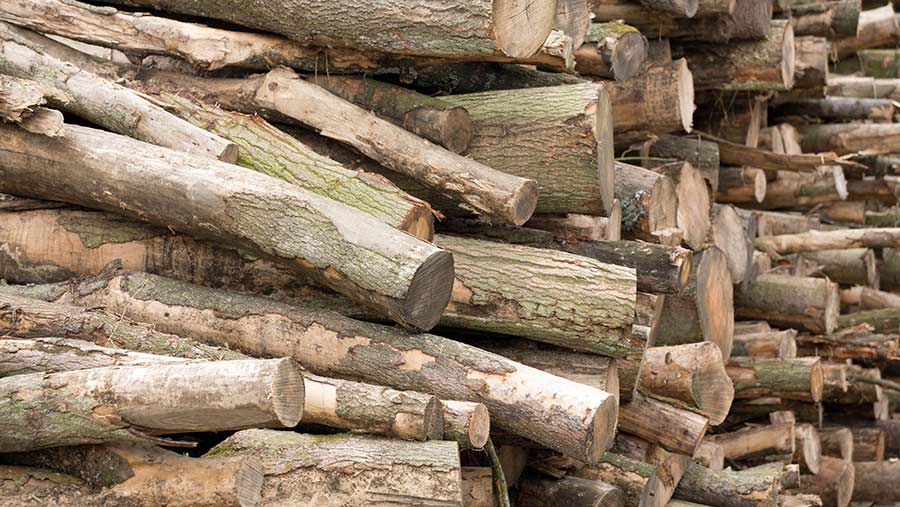Stricter rules on firewood sales – what you need to know
 © Tim Scrivener
© Tim Scrivener Firewood sales are to be regulated to outlaw the burning of wet wood and help the UK government meet its air pollution ambitions.
By May 2022, all sales of firewood in England of 2cu m or less must have a moisture content of 20% or lower to be fit for sale. This rule is already in place for larger suppliers.
Legislation came into effect from 1 May 2021 for those selling more than 600cu m a year; all the firewood they sell in volumes of less than 2cu m must be certified as “Ready to Burn”.
See also: More diversification advice and case studies online
Those who sell less than 600cu m have until 30 April 2022 to comply with the new certification scheme.
Woodsure is a Tewkesbury-based not-for-profit body appointed by Defra to run the Ready to Burn label.
Its director Helen Bentley-Fox says that through the Clean Air Strategy 2019, the government made a commitment to reduce UK particulate matter emissions by 46% by 2030.
An explicit connection has been made between burning wet wood and poor air quality, as emissions from wet wood are about five times those from burning firewood with a moisture content of 20% or lower.
The rules apply initially only in England, but Wales and Scotland are considering a similar strategy.
Ready to Burn certification
The Ready to Burn certification scheme covers all sales of less than 2cu m. This threshold has been chosen because above this, customers are likely to have the ability to store and season wood, says Ms Bentley-Fox.
“At under 2cu m, we would expect the customer to be wanting to use the fuel immediately and it is therefore key that the fuel they use is certified and labelled as Ready to Burn,’’ she says.
Woodsure is keen to minimise the administration burden of the legislation, especially for those producing small quantities, such as farmers, says Ms Bentley-Fox.
It is working with the Small Woods Association and others to set up a group scheme for those supplying less than 600cu m a year, to ensure compliance isn’t prohibitive to their business.
How do I get accreditation to continue selling wood?
Submit an application to join Ready to Burn. You will need to provide a representative sample of the wood you sell, and evidence of how you source wood and control its moisture content.
Woodsure will also need the locations of stores and the names of any retail outlets and websites that sell your fuel wood.
Fees for the scheme are based on volume sold, so annual sales figures for the previous year will be needed with the application.
What will it cost me?
This depends on the volume of sales. There is an application fee of £102 and an annual registration fee of £321, both before VAT. The annual fee includes a routine site audit, listing, fuel test and certification.
Point of sales checks are needed too, costing between £112 and £1,020 for businesses selling direct to customers, or more if the operation is larger than 20,000cu m.
For businesses selling through retail outlets, the fee is between £224 and £2,040, again higher for sales of more than 20,000cu m.
For those producing very small quantities, where the cost of joining Ready to Burn as an individual would be prohibitive, Woodsure is piloting group schemes, which, it says, will bring joining cost down to less than £100.
Will I need to invest in new equipment to be compliant?
A moisture meter helps, while for businesses in wetter areas, covered storage might be needed. Some suppliers have invested in polytunnels to speed up the drying process.
Many suppliers can achieve a moisture content of 20% or less without changing their practices or by adapting processes just a little, says Woodsure.
Who enforces the rules?
Local authorities are responsible for this. Enforcement officers may carry out spot checks, including on how wood is stored and to ensure customers are provided with the correct information on drying.
What if I am found in breach of the rules?
Those found selling unauthorised or incorrectly labelled fuel could face a fixed penalty notice for £300.
Severe breaches could result in court action, possibly leading to higher fines.
Why are smaller suppliers being given longer to comply?
This caters for areas where longer seasoning is required, and to give suppliers time to adapt processes and experiment with different ways to improve their product.
More information can be found on the Woodsure website, email or telephone 01684 278 188.
